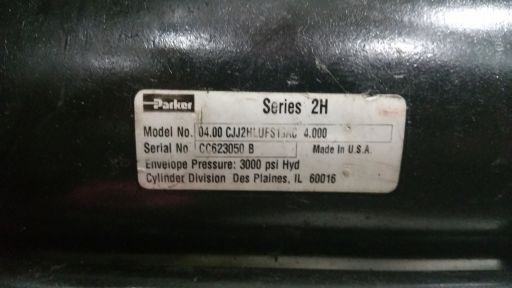The Designer's Edge: Avoiding Cylinder Failure
Today Randy explains the importance of knowing the exact hydraulic PSI to be used to avoid cylinder failures.

This cylinder is rated for 3,000 psi and a four-inch bore size.
The importance of knowing the exact hydraulic PSI to be used is often overlooked. It is as important as knowing cavity pressure. Keep in mind that on some machines the core pressure can be set up as pressure-limited with a pressure relief valve. So, if the relief valve is set lower, the actual pressure will not increase when you change the pressure on the controller. What your controller says may not be actual. For an accurate determination, use an inline pressure gage to measure the pressure.
From the example in the previous blog, if pressure is limited to 1,000 PSI, you would blow back the cylinder because you would only be applying 7,065 pounds of force to counteract the 10,000 pounds of force that the cavity is applying to the core surface. After witnessing this many times, upsizing the cylinders was a solution. However, in one instance it was not an option, so instead we added a second set of cylinders to activate a lock that holds the component in place. This made the tool more complex with a suicide condition.If pressure is limited to 1,000 PSI, you would blow back the cylinder because you would only be applying 7,065 pounds of force to counteract the 10,000 pounds of force that the cavity is applying to the core surface. After witnessing this many times, upsizing the cylinders was a solution. However, in one instance it was not an option, so instead we added a second set of cylinders to activate a lock that holds the component in place. This made the tool more complex with a suicide condition.
The PSI rating on the cylinder itself should also be considered. If the cylinder is only rated for 1,500 hydraulic PSI and you use 2,000 hydraulic PSI, you will have cylinder failures with leaks and blown seals. For example, when a cylinder is not rated for the hydraulic pressure being used (for example, a cylinder rated for 1,500 psi and using 2,000 hydraulic psi) add an inline pressure-limiting valve on the mold to protect the cylinder from failures. Also, when a cylinder is rated for a pressure that is not necessary you can add this valve to protect the moving components from failure. Note that cylinders for some hydraulic valve gates are not rated for high pressures.















